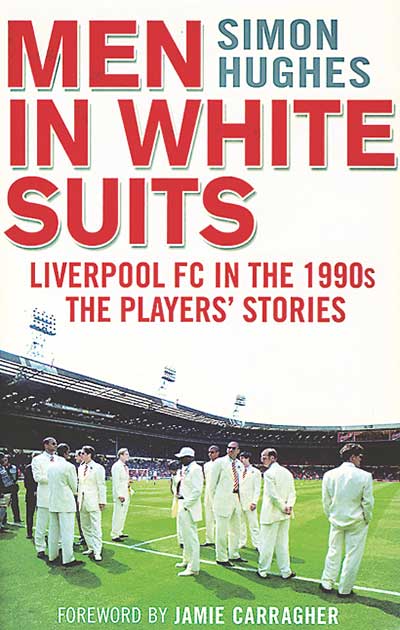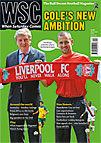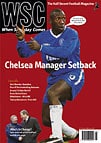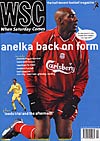Search: ' Julian Dicks'
Stories
 Liverpool FC in the 1990s – the players’ stories
Liverpool FC in the 1990s – the players’ stories
by Simon Hughes
Bantam, £18.99
Reviewed by Rob Hughes
From WSC 340 June 2015
Among the insightful voices in Simon Hughes’s book, John Scales cuts to the issue most succinctly. “Money changed the game and it’s no surprise that a club with socialist principles was the first to fall by the wayside,” he says, referring to the ethos promoted by Bill Shankly, the manager who revolutionised the club in the 1960s. The 1990s was a time of rapid change in English football, where big clubs became global businesses, revenue flooded in from international TV deals and wages ballooned. This increased market competition, however, was just one of the many factors in Liverpool’s decline.
Much like its predecessor, 2013’s Red Machine: Liverpool FC In The 1980s, Hughes’s tome tells the story through interviews with a number of former players and managers. Alongside Scales we have Jan Molby, Jamie Redknapp, Jason McAteer, Graeme Souness and Roy Evans, among others, all of whom look back on their Liverpool tenure with a variable mixture of pride, regret and, occasionally, a little bitterness.
The title of Men In White Suits recalls the team’s ill-advised Wembley walkabout before the 1996 FA Cup final, decked out in flashy Armani gear, and provides the ready metaphor for Liverpool’s failings under Evans. Here was a team capable of the most flamboyant football, but who seemed to lack the required focus and discipline to win trophies: all silk and no steel.
What quickly becomes clear, sifting through the various testimony, is that Liverpool were undone by their own past success. Coaches and management still relied on the same procedures, diets and training methods (even continuing to use the rotting wooden boards at the Melwood training ground for shooting practice) that had sustained the club throughout the 1970s and 1980s. Other clubs, meanwhile, had moved with the times and had adopted a more sophisticated ideology. And when it came to the transfer market (shipping out Peter Beardsley and others before their prime; investing in the likes of Julian Dicks, Paul Stewart and Nigel Clough) it all got pretty embarrassing.
The conclusions of those involved are often fascinating. Both Redknapp and Molby agree that Souness’s management style was unnecessarily aggressive, intent on changing too much too soon. Souness himself, with engaging candour, concedes that he blew his chance and that it was the right job at the wrong time. Evans, too, is big enough to admit some shortcomings, not least the gung-ho attitude to attacking football when grinding out results was often the better option. Although he bristles at the suggestion that he was too much of a nice guy to rule effectively.
The potential to reclaim old glories was certainly there, assert McAteer and Scales, but they attribute Liverpool’s inconsistency to the lack of experienced, “streetwise” leaders on the pitch. And, for fans such as myself, it makes me wince to read how Souness turned down the chance to sign both Peter Schmeichel and Eric Cantona before they were anywhere near Manchester United’s radar. Inconstancy, woeful transfer dealings, lack of leadership and an inability to compete with the top clubs around them. Thank God those days are over.
 A cautionary tale of foiled ambition, financial crisis and battles with several authorities. Gary Andrews explains where it all went wrong
A cautionary tale of foiled ambition, financial crisis and battles with several authorities. Gary Andrews explains where it all went wrong
Plenty of non-League clubs have gone from play-off contenders to penniless relegation fodder in recent years, but Grays Athletic are one of the most extreme cases. Four years ago they came close to promotion to the Football League with one of the best Conference teams of the past decade. But what followed was a mix of managerial instability, stadium issues and, ultimately, near-extinction.
 Once upon a time Dave Boyle found the idea of squad numbers exotic, but recent galloping inflation has caused him to question his own and football's sanity, while Barney Ronay has been looking into the wider history of the numbers game
Once upon a time Dave Boyle found the idea of squad numbers exotic, but recent galloping inflation has caused him to question his own and football's sanity, while Barney Ronay has been looking into the wider history of the numbers game
The first leg defeat of Manchester United by Porto was the moment when I realised that football had, beyond all reasonable doubt, gone mad.
 Saturday 1 England draw Argentina, Sweden and Nigeria in their World Cup group, with France the likely opponents should they reach the second round. Ireland get Germany, Cameroon and Saudi Arabia. Sven offers a thin smile: “I hope we have more luck in the matches than we had in the draw.” “I must have run over a lot of black cats,” sighs Colin Todd as Fabby misses a penalty for the second successive week, allowing leaders Liverpool to sneak a win at Derby through a Michael Owen goal. Sir Alex pretends to throw in the towel again – “I don’t think we can win the title now” – after Man Utd’s 3-0 home defeat by Chelsea leaves them eight points off the top. Alan Shearer’s contentious dismissal during Newcastle’s 1-1 draw at Charlton has his manager hopping mad: “It’s an insult to a player who has graced the game.” Burnley return to the top of the First Division, beating Palace 2-1. Brighton lead the Second by three points, Plymouth hold a four-point lead in the Third, where Bristol Rovers are now just two points off the bottom after defeat at Rushden. Luton face a possible three-point deduction after calling off their trip to Kidderminster due to a flu outbreak. League investigators will visit the club with a coughometer.
Saturday 1 England draw Argentina, Sweden and Nigeria in their World Cup group, with France the likely opponents should they reach the second round. Ireland get Germany, Cameroon and Saudi Arabia. Sven offers a thin smile: “I hope we have more luck in the matches than we had in the draw.” “I must have run over a lot of black cats,” sighs Colin Todd as Fabby misses a penalty for the second successive week, allowing leaders Liverpool to sneak a win at Derby through a Michael Owen goal. Sir Alex pretends to throw in the towel again – “I don’t think we can win the title now” – after Man Utd’s 3-0 home defeat by Chelsea leaves them eight points off the top. Alan Shearer’s contentious dismissal during Newcastle’s 1-1 draw at Charlton has his manager hopping mad: “It’s an insult to a player who has graced the game.” Burnley return to the top of the First Division, beating Palace 2-1. Brighton lead the Second by three points, Plymouth hold a four-point lead in the Third, where Bristol Rovers are now just two points off the bottom after defeat at Rushden. Luton face a possible three-point deduction after calling off their trip to Kidderminster due to a flu outbreak. League investigators will visit the club with a coughometer.